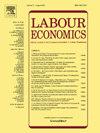Why do labor unions advocate for minimum wage increases?
IF 2.6
2区 经济学
Q2 ECONOMICS
引用次数: 0
Abstract
Over the past decade, organized labor has played a significant role in advocating for minimum wage increases. Why might this be, given that the minimum wage may act as a substitute for the bargaining power offered by labor unions? In this paper, we study the interplay between minimum wages and union membership. Using variation in U.S. states’ minimum wages during the 2010s, we estimate that each dollar in minimum wage increase predicts a 5 percent increase (0.3 pp) in the likelihood of union membership among individuals ages 16–40. Consistent with a classic “free-riding” hypothesis, however, we find that minimum wage increases predict declines in union membership among the minimum wage's most direct beneficiaries. Instead, increases in union membership occur among much broader groups that are not directly affected by the minimum wage.
为什么工会主张提高最低工资?
在过去十年中,劳工组织在倡导提高最低工资方面发挥了重要作用。考虑到最低工资可能会取代工会提供的议价能力,这是为什么呢?在本文中,我们研究了最低工资与工会成员之间的相互作用。根据2010年代美国各州最低工资的变化,我们估计,最低工资每增加一美元,16-40岁的人加入工会的可能性就会增加5%(0.3个百分点)。然而,与经典的“搭便车”假设一致,我们发现,最低工资的提高预示着最低工资最直接受益者中的工会成员数量的下降。相反,工会成员的增加发生在更广泛的群体中,这些群体不受最低工资的直接影响。
本文章由计算机程序翻译,如有差异,请以英文原文为准。
求助全文
约1分钟内获得全文
求助全文
来源期刊

Labour Economics
ECONOMICS-
CiteScore
3.60
自引率
8.30%
发文量
142
期刊介绍:
Labour Economics is devoted to publishing research in the field of labour economics both on the microeconomic and on the macroeconomic level, in a balanced mix of theory, empirical testing and policy applications. It gives due recognition to analysis and explanation of institutional arrangements of national labour markets and the impact of these institutions on labour market outcomes.
 求助内容:
求助内容: 应助结果提醒方式:
应助结果提醒方式:


